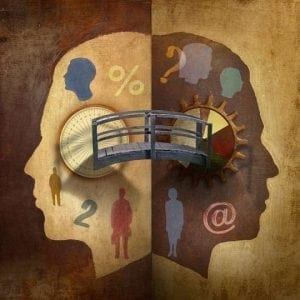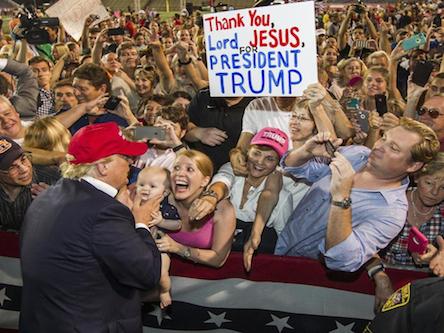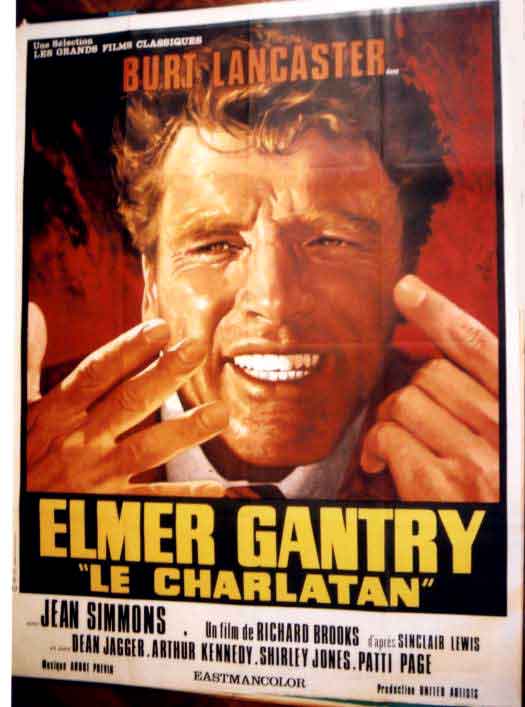 Henry A. Giroux
Henry A. Giroux
Cultural Critic and Public Intellectual
 [dropcap]T[/dropcap]he dark times that haunt the current age are epitomized in the monsters that have come to rule the United States and who now dominate the major political parties and other commanding political and economic institutions. Their nightmarish reign of misery, violence, and disposability is also evident in their dominance of a formative culture and its attendant cultural apparatuses that produce a vast machinery of manufactured consent. This is a social formation that extends from the mainstream broadcast media and Internet to a print culture, all of which embrace the spectacle of violence, legitimate opinions over facts, and revel in a celebrity and consumer culture of ignorance and theatrics. Under the reign of this normalized ideological architecture of alleged commonsense, literacy is now regarded with disdain, words are reduced to data, and science is confused with pseudo-science.
[dropcap]T[/dropcap]he dark times that haunt the current age are epitomized in the monsters that have come to rule the United States and who now dominate the major political parties and other commanding political and economic institutions. Their nightmarish reign of misery, violence, and disposability is also evident in their dominance of a formative culture and its attendant cultural apparatuses that produce a vast machinery of manufactured consent. This is a social formation that extends from the mainstream broadcast media and Internet to a print culture, all of which embrace the spectacle of violence, legitimate opinions over facts, and revel in a celebrity and consumer culture of ignorance and theatrics. Under the reign of this normalized ideological architecture of alleged commonsense, literacy is now regarded with disdain, words are reduced to data, and science is confused with pseudo-science.
Thinking is now regarded as an act of stupidity, and ignorance a virtue. All traces of critical thought appear only at the margins of the culture as ignorance becomes the primary organizing principle of American society. For instance, two thirds of the American public believe that creationism should be taught in schools and most of the Republic Party in Congress do not believe that climate change is caused by human activity, making the U.S. the laughing stock of the world. Politicians endlessly lie knowing that the public is addicted to shocks, which allows them to drown in overstimulation and live in an ever-accelerating overflow of information and images. News has become entertainment and echoes reality rather than interrogating it. Unsurprisingly, education in the larger culture has become a disimagination machine, a tool for legitimating ignorance, and it is central to the formation of an authoritarian politics that has gutted any vestige of democracy from the ideology, policies, and institutions that now control American society.
I am not talking simply about the kind of anti-intellectualism that theorists such a Richard Hofstadter, Ed Herman and Noam Chomsky, and more recently Susan Jacoby have documented, however insightful their analyses might be. I am pointing to a more lethal form of illiteracy that is often ignored. Illiteracy is now a scourge and a political tool designed primarily to make war on language, meaning, thinking, and the capacity for critical thought. Chris Hedges is right in stating that “the emptiness of language is a gift to demagogues and the corporations that saturate the landscape with manipulated images and the idiom of mass culture.”[1] The new form of illiteracy does not simply constitute an absence of learning, ideas, or knowledge. Nor can it be solely attributed to what has been called the “smartphone society.”[2] On the contrary, it is a willful practice and goal used to actively depoliticize people and make them complicit with the forces that impose misery and suffering upon their lives.
Manufactured Illiteracy, Consumer Fantasies, and the Repression of the Population.
Gore Vidal once called America the United States of Amnesia. The title should be extended to the United States of Amnesia and Willful Illiteracy. Illiteracy no longer simply marks populations immersed in poverty with little access to quality education; nor does it only suggest the lack of proficient skills enabling people to read and write with a degree of understanding and fluency. More profoundly, illiteracy is also about what it means not to be able to act from a position of thoughtfulness, informed judgment, and critical agency. Illiteracy has become a form of political repression that discourages a culture of questioning, renders agency as an act of intervention inoperable, and restages power as a mode of domination. It is precisely this mode of illiteracy that now constitutes the modus operandi of a society that both privatizes and kills the imagination by poisoning it with falsehoods, consumer fantasies, data loops, and the need for instant gratification. This is a mode of manufactured illiteracy and education that has no language for relating the self to public life, social responsibility or the demands of citizenship. It is important to recognize that the rise of this new mode of illiteracy is not simply about the failure of public and higher education to create critical and active citizens; it is about a society that eliminates those public spheres that make thinking possible while imposing a culture of fear in which there is the looming threat that anyone who holds power accountable will be punished. At stake here is not only the crisis of a democratic society, but a crisis of memory, ethics, and agency.
Evidence of such a repressive policy is visible in the growth of the surveillance state, the suppression of dissent, especially among Black youth, the elimination of tenure in states such as Wisconsin, the rise of the punishing state, and the militarization of the police. It is also evident in the demonization, punishing, and war waged by the Obama administration on whistleblowers such as Edward Snowden, Chelsea Manning, and Jeffrey Sterling, among others. Any viable attempt at developing a radical politics must begin to address the role of education and civic literacy and what I have termed public pedagogy as central not only to politics itself but also to the creation of subjects capable of becoming individual and social agents willing to struggle against injustices and fight to reclaim and develop those institutions crucial to the functioning and promises of a substantive democracy. One place to begin to think through such a project is by addressing the meaning and role of pedagogy as part of the broader struggle for and practice of freedom.
The reach of pedagogy extends from schools to diverse cultural apparatuses such as the mainstream media, alternative screen cultures, and the expanding digital screen culture. Far more than a teaching method, pedagogy is a moral and political practice actively involved not only in the production of knowledge, skills, and values but also in the construction of identities, modes of identification, and forms of individual and social agency. Accordingly, pedagogy is at the heart of any understanding of politics and the ideological scaffolding of those framing mechanisms that mediate our everyday lives. Across the globe, the forces of free-market fundamentalism are using the educational force of the wider culture and the takeover of public and higher education both to reproduce the culture of business and to wage an assault on the historically guaranteed social provisions and civil rights provided by the welfare state, public schools, unions, women’s reproductive rights, and civil liberties, among others, all the while undercutting public faith in the defining institutions of democracy.
As market mentalities and moralities tighten their grip on all aspects of society, democratic institutions and public spheres are being downsized, if not altogether disappearing. As these institutions vanish—from public schools and alternative media to health care centers– there is also a serious erosion of the discourses of community, justice, equality, public values, and the common good. This grim reality has been called by Alex Honneth a “failed sociality”– a failure in the power of the civic imagination, political will, and open democracy. It is also part of a politics that strips the social of any democratic ideals and undermines any understanding of education as a public good and pedagogy as an empowering practice, a practice which acts directly upon the conditions which bear down on our lives in order to change them when necessary.

George Carlin on government
One of the challenges facing the current generation of educators, students, progressives, and other cultural workers is the need to address the role they might play in educating students to be critically engaged agents, attentive to addressing important social issues and being alert to the responsibility of deepening and expanding the meaning and practices of a vibrant democracy. At the heart of such a challenge is the question of what education should accomplish not simply in a democracy but at a historical moment when the United States is about to slip into the dark night of authoritarianism. What work do educators have to do to create the economic, political, and ethical conditions necessary to endow young people and the general public with the capacities to think, question, doubt, imagine the unimaginable, and defend education as essential for inspiring and energizing the citizens necessary for the existence of a robust democracy? In a world in which there is an increasing abandonment of egalitarian and democratic impulses, what will it take to educate young people and the broader polity to challenge authority and hold power accountable?
What role might education and critical pedagogy have in a society in which the social has been individualized, emotional life collapses into the therapeutic, and education is reduced to either a private affair or a kind of algorithmic mode of regulation in which everything is reduced to a desired outcome. What role can education play to challenge the deadly neoliberal claim that all problems are individual, regardless of whether the roots of such problems like in larger systemic forces. In a culture drowning in a new love affair with instrumental rationality, it is not surprising that values that are not measurable– compassion, vision, the imagination, trust, solidarity, care for the other, and a passion for justice—withers.
Given the crisis of education, agency, and memory that haunts the current historical conjuncture, the left and other progressives need a new language for addressing the changing contexts and issues facing a world in which there is an unprecedented convergence of resources–financial, cultural, political, economic, scientific, military, and technological– increasingly used to exercise powerful and diverse forms of control and domination. Such a language needs to be political without being dogmatic and needs to recognize that pedagogy is always political because it is connected to the acquisition of agency. In this instance, making the pedagogical political means being vigilant about “that very moment in which identities are being produced and groups are being constituted, or objects are being created.”[3] At the same time it means progressives need to be attentive to those practice in which critical modes of agency and particular identities are being denied. It also means developing a comprehensive understanding of politics, one that should begin with the call to reroute single issue politics into a mass social movement under the banner of a defense of the public good, the commons, and a global democracy.
In part, this suggests developing pedagogical practices that not only inspire and energize people but are also capable of challenging the growing number of anti-democratic practices and policies under the global tyranny of casino capitalism. Such a vision suggests resurrecting a radical democratic project that provides the basis for imagining a life beyond a social order immersed in massive inequality, endless assaults on the environment, and elevates war and militarization to the highest and most sanctified national ideals. Under such circumstances, education becomes more than an obsession with accountability schemes, an audit culture, market values, and an unreflective immersion in the crude empiricism of a data-obsessed market-driven society. In addition, it rejects the notion that all levels of schooling can be reduced to sites for training students for the workforce and that the culture of public and higher education is synonymous with the culture of business.
At issue here is the need for progressives to recognize the power of education in creating the formative cultures necessary to both challenge the various threats being mobilized against the ideas of justice and democracy while also fighting for those public spheres, ideals, values, and policies that offer alternative modes of identity, thinking, social relations, and politics. But embracing the dictates of a making education meaningful in order to make it critical and transformative also means recognizing that cultural apparatuses such as the mainstream media and Hollywood films are teaching machines and not simply sources of information and entertainment. Such sites should be spheres of struggle removed from the control of the financial elite and corporations who use them as propaganda and disimagination machines.
Central to any viable notion that what makes pedagogy critical is, in part, the recognition that it is a moral and political practice that is always implicated in power relations because it narrates particular versions and visions of civic life, community, the future, and how we might construct representations of ourselves, others, and our physical and social environment. It is in this respect that any discussion of pedagogy must be attentive to how pedagogical practices work in a variety of sites to produce particular ways in which identity, place, worth, and above all value are organized and contribute to producing a formative culture capable of sustaining a vibrant democracy.[4]
 In this instance, pedagogy as the practice of freedom emphasizes critical reflection, bridging the gap between learning and everyday life, understanding the connection between power and difficult knowledge, and extending democratic rights and identities by using the resources of history and theory. However, among many educators, progressives, and social theorists, there is a widespread refusal to recognize that this form of education not only takes place in schools, but is also part of what can be called the educative nature of the culture. At the core of analysing and engaging culture as a pedagogical practice are fundamental questions about the educative nature of the culture, what it means to engage common sense as a way to shape and influence popular opinion, and how diverse educational practices in multiple sites can be used to challenge the vocabularies, practices, and values of the oppressive forces that at work under neoliberal regimes of power.
In this instance, pedagogy as the practice of freedom emphasizes critical reflection, bridging the gap between learning and everyday life, understanding the connection between power and difficult knowledge, and extending democratic rights and identities by using the resources of history and theory. However, among many educators, progressives, and social theorists, there is a widespread refusal to recognize that this form of education not only takes place in schools, but is also part of what can be called the educative nature of the culture. At the core of analysing and engaging culture as a pedagogical practice are fundamental questions about the educative nature of the culture, what it means to engage common sense as a way to shape and influence popular opinion, and how diverse educational practices in multiple sites can be used to challenge the vocabularies, practices, and values of the oppressive forces that at work under neoliberal regimes of power.
There is an urgent political need for the American public to understand what it means for an authoritarian society to both weaponize and trivialize the discourse, vocabularies, images, and aural means of communication in a society. How is language used to relegate citizenship to the singular pursuit of cravenly self-interests, legitimate shopping as the ultimate expression of one’s identity, portray essential public services as reinforcing and weakening any viable sense of individual responsibility, and, among other, instances, using the language of war and militarization to describe a vast array of problems we face as a nation. War has become an addiction, the war on terror a Pavlovian stimulant for control, and shared fears one of the few discourses available for defining any vestige of solidarity.
Such falsehoods are now part of the reigning neoliberal ideology proving once again that pedagogy is central to politics itself because it is about changing the way people see things, recognizing that politics is educative and that domination resided not simply in repressive economic structures but also in the realm of ideas, beliefs, and modes of persuasion. Just as I would argue that pedagogy has to be made meaningful in order to be made critical and transformative, I think it is fair to argue that there is no politics without a pedagogy of identification; that is, people have to invest something of themselves in how they are addressed or recognize that any mode of education, argument, idea, or pedagogy has to speak to their condition and provide a moment of recognition.
Lacking this understanding, pedagogy all too easily becomes a form of symbolic and intellectual violence, one that assaults rather than educates. Another example can be seen in the forms of high stakes testing and empirically driven teaching that dominate public schooling in the United States, which amounts to pedagogies of repression which serve primarily to numb the mind and produce what might be called dead zones of the imagination. These are pedagogies that are largely disciplinary and have little regard for contexts, history, making knowledge meaningful, or expanding what it means for students to be critically engaged agents.
The fundamental challenge facing educators within the current age of neoliberalism, militarism, and religious fundamentalism is to provide the conditions for students to address how knowledge is related to the power of both self-definition and social agency. In part, this suggests providing students with the skills, ideas, values, and authority necessary for them to nourish a substantive democracy, recognize anti-democratic forms of power, and to fight deeply rooted injustices in a society and world founded on systemic economic, racial, and gendered inequalities. A as Hannah Arendt, once argued in “The Crisis of Education,” the centrality of education to politics is also manifest in the responsibility for the world that cultural workers have to assume when they engage in pedagogical practices that lie on the side of belief and persuasion, especially when they challenge forms of domination.
Such a project suggests developing a transformative pedagogy–rooted in what might be called a project of resurgent and insurrectional democracy–that relentlessly questions the kinds of labor, practices, and forms of production that are enacted in schools and other sites of education. The project in this sense speaks to the recognition that any pedagogical practice presupposes some notion of the future, prioritises some forms of identification over others, upholds selective modes of social relations, and values some modes of knowing over others (think about how business schools are held in high esteem while schools of education are disdained and even the object in some cases of contempt). Moreover, such a pedagogy does not offer guarantees as much as it recognizes that its own position is grounded in particular modes of authority, values, and ethical principles that must be constantly debated for the ways in which they both open up and close down democratic relations, values, and identities. These are precisely the questions being asked by the Chicago Teachers’ Union in their brave fight to regain some control over both the conditions of their work and their efforts to redefine the meaning of schooling as a democratic public sphere and learning in the interest of economic justice and progressive social change.
Such a project should be principled, relational, contextual, as well as self-reflective and theoretically rigorous. By relational, I mean that the current crisis of schooling must be understood in relation to the broader assault that is being waged against all aspects of democratic public life. At the same time, any critical comprehension of those wider forces that shape public and higher education must also be supplemented by an attentiveness to the historical and conditional nature of pedagogy itself. This suggests that pedagogy can never be treated as a fixed set of principles and practices that can be applied indiscriminately across a variety of pedagogical sites. Pedagogy is not some recipe or methodological fix that can be imposed on all classrooms. On the contrary, it must always be contextually defined, allowing it to respond specifically to the conditions, formations, and problems that arise in various sites in which education takes place. Such a project suggests recasting pedagogy as a practice that is indeterminate, open to constant revision, and constantly in dialogue with its own assumptions.
The notion of a neutral, objective education is an oxymoron. Education and pedagogy do not exist outside of relations of power, values, and politics. Ethics on the pedagogical front demands an openness to the other, a willingness to engage a “politics of possibility” through a continual critical engagement with texts, images, events, and other registers of meaning as they are transformed into pedagogical practices both within and outside of the classroom. Pedagogy is never innocent and if it is to be understood and problematized as a form of academic labor, cultural workers have the opportunity not only to critically question and register their own subjective involvement in how and what they teach in and out of schools, but also to resist all calls to depoliticize pedagogy through appeals to either scientific objectivity or ideological dogmatism. This suggests the need for educators to rethink the cultural and ideological baggage they bring to each educational encounters; it also highlights the necessity of making educators ethically and politically accountable and self-reflective for the stories they produce, the claims they make upon public memory, and the images of the future they deem legitimate. Understood as a form of militant hope, pedagogy in this sense is not an antidote to politics, a nostalgic yearning for a better time, or for some “inconceivably alternative future.” Instead, it is an “attempt to find a bridge between the present and future in those forces within the present which are potentially able to transform it.”[5]
At the dawn of the 21st century, the notion of the social and the public are not being erased as much as they are being reconstructed under circumstances in which public forums for serious debate, including public education, are being eroded. Reduced either to a crude instrumentalism, business culture, or defined as a purely private right rather than a public good, our major educational apparatuses are removed from the discourse of democracy and civic culture. Under the influence of powerful financial interests, we have witnessed the takeover of public and increasingly higher education and diverse media sites by a corporate logic that both numbs the mind and the soul, emphasizing repressive modes of ideology hat promote winning at all costs, learning how not to question authority, and undermining the hard work of learning how to be thoughtful, critical, and attentive to the power relations that shape everyday life and the larger world. As learning is privatized, depoliticized, and reduced to teaching students how to be good consumers, any viable notions of the social, public values, citizenship, and democracy wither and die.
As a central element of a broad based cultural politics, critical pedagogy, in its various forms, when linked to the ongoing project of democratization can provide opportunities for educators and other cultural workers to redefine and transform the connections among language, desire, meaning, everyday life, and material relations of power as part of a broader social movement to reclaim the promise and possibilities of a democratic public life. Critical pedagogy is dangerous to many people and others because it provides the conditions for students and the wider public to exercise their intellectual capacities, embrace the ethical imagination, hold power accountable, and embrace a sense of social responsibility.
One of the most serious challenges facing teachers, artists, journalists, writers, and other cultural workers is the task of developing a discourse of both critique and possibility. This means developing discourses and pedagogical practices that connect reading the word with reading the world, and doing so in ways that enhance the capacities of young people as critical agents and engaged citizens. In taking up this project, educators and others should attempt to create the conditions that give students the opportunity to become critical and engaged citizens who have the knowledge and courage to struggle in order to make desolation and cynicism unconvincing and hope practical. But raising consciousness is not enough. Students need to be inspired and energized to address important social issues, learning to narrate their private troubles as public issues, and to engage in forms of resistance that are both local and collective, while connecting such struggles to more global issues.
Democracy begins to fail and political life becomes impoverished in the absence of those vital public spheres such as public and higher education in which civic values, public scholarship, and social engagement allow for a more imaginative grasp of a future that takes seriously the demands of justice, equity, and civic courage. Democracy should be a way of thinking about education, one that thrives on connecting equity to excellence, learning to ethics, and agency to the imperatives of social responsibility and the public good. The question regarding what role education should play in democracy becomes all the more urgent at a time when the dark forces of authoritarianism are on the march in the United States. As public values, trust, solidarities, and modes of education are under siege, the discourses of hate, racism, rabid self-interest, and greed are exercising a poisonous influence in American society, most evident in the discourse of the right-wing extremists such as Donald Trump and Ted Cruz, vying for the American presidency. Civic illiteracy collapses opinion and informed arguments, erases collective memory, and becomes complicit with the militarization of both individual, public spaces, and society itself. Under such circumstances, politicians such as Hilary Clinton are labeled as liberals when in reality they are firm advocates for both a toxic militarism and the interests of the financial elites.
All across the country, there are signs of hope. Young people are protesting against student debt; environmentalists are aggressively fighting corporate interests; the Chicago Teachers Union is waging a brave fight against oppressive neoliberal modes of governance; Black youth are bravely resisting and exposing state violence in all of its forms; prison abolitionists are making their voices heard, and once again the threat of a nuclear winter is being widely discussed. In the age of financial and political monsters, neoliberalism has lost its ability to legitimate itself in a warped discourse of freedom and choice. Its poisonous tentacles have put millions out of work, turned many Black communities into war zones, destroyed public education, flagrantly pursued war as the greatest of national ideals, turned the prison system into a default institution for punishing minorities of race and class, pillaged the environment, and blatantly imposed a new mode of racism under the silly notion of a post-racial society.
The extreme violence perpetuated in the daily spectacles of the cultural apparatuses are now becoming more visible in the relations of everyday life making it more difficult for many American to live the lie that they are real and active participants in a democracy. As the lies are exposed, the economic and political crises ushering in authoritarianism are now being matched by a crisis of ideas. If this momentum of growing critique and collective resistance continues, the support we see for Bernie Sanders among young people will be matched by an increase in the growth of other oppositional groups. Groups organized around single issues such as an insurgent labor movements, those groups trying to reclaim public education as a public good, and other emerging movements will come together hopefully, refusing to operate within the parameters of established power while working to create a broad-based social movement. In the merging of the power, culture, new public spheres, new technologies, and old and new social movements, there is a hint of a new collective political sensibility emerging, one that offers a new mode of collective resistance and the possibility of taking democracy off life-support. This is not a struggle over who will be elected the next president or ruling party of the United States, but a struggle over those who are willing to fight for a radical democracy and those who are not. The strong winds of resistance are in the air, rattling established interests, forcing liberals to recognize their complicity with established power, and giving new life the meaning of what it means to fight for a democratic social order in which equity and justice prevail for everyone.
Notes.
[1] Chris Hedges, “The War on Language”, TruthDig, (September 28, 2009)
online at: http://www.truthdig.com/report/item/20090928_the_war_on_language/
[2] Nicole Aschoff, “The Smartphone Society,” Jacobin Magazine, Issue 17, (Spring 2015). Online at: https://www.jacobinmag.com/2015/03/smartphone-usage-technology-aschoff/
[3] Gary Olson and Lynn Worsham, “Staging the Politics of Difference: Homi Bhabha’s Critical Literacy,” Journal of Advanced Composition (1999), pp. 3-35.
[4]. Henry A. Giroux, Education and the Crisis of Public Values, 2nd edition (New York: Peter Lang, 2015).
[5]. Terry Eagleton, The Idea of Culture (Malden, MA: Basil Blackwell, 2000), p.22.
 Simultaneously published with CounterPunch
Simultaneously published with CounterPunch

Henry A. Giroux, Contributing Editor

C
urrently holds the Global TV Network Chair Professorship at McMaster University in the English and Cultural Studies Department and a Distinguished Visiting Professorship at Ryerson University. His books include: Zombie Politics and Culture in the Age of Casino Capitalism (Peter Land 2011), On Critical Pedagogy (Continuum, 2011), Twilight of the Social: Resurgent Publics in the Age of Disposability (Paradigm 2012), Disposable Youth: Racialized Memories and the Culture of Cruelty (Routledge 2012), Youth in Revolt: Reclaiming a Democratic Future (Paradigm 2013). Giroux’s most recent books are America’s Education Deficit and the War on Youth (Monthly Review Press, 2013), are Neoliberalism’s War on Higher Education, America’s Disimagination Machine (City Lights) and Higher Education After Neoliberalism (Haymarket) will be published in 2014). He is also a Contributing Editor of Cyrano’s Journal Today / The Greanville Post, and member of Truthout’s Board of Directors and has his own page The Public Intellectual. His web site is www.henryagiroux.com.

=SUBSCRIBE TODAY! NOTHING TO LOSE, EVERYTHING TO GAIN.=
free • safe • invaluable
If you appreciate our articles, do the right thing and let us know by subscribing. It’s free and it implies no obligation to you—ever. We just want to have a way to reach our most loyal readers on important occasions when their input is necessary. In return you get our email newsletter compiling the best of The Greanville Post several times a week.
[email-subscribers namefield=”YES” desc=”” group=”Public”]

 In his zeal to prove to his antagonists in the War Party that he is as bloodthirsty as their champion, Hillary Clinton, and more manly than Barack Obama, Trump seems to have gone “play-crazy” -- acting like an unpredictable maniac in order to terrorize the Russians into forcing some kind of dramatic concessions from their Syrian allies, or risk Armageddon.However, the “play-crazy” gambit can only work when the leader is, in real life, a disciplined and intelligent actor, who knows precisely what actual boundaries must not be crossed. That ain’t Donald Trump -- a pitifully shallow and ill-disciplined man, emotionally handicapped by obscene privilege and cognitively crippled by white American chauvinism. By pushing Trump into a corner and demanding that he display his most bellicose self, or be ceaselessly mocked as a “puppet” and minion of Russia, a lesser power, the War Party and its media and clandestine services have created a perfect storm of mayhem that may consume us all.— Glen Ford, Editor in Chief, Black Agenda Report
In his zeal to prove to his antagonists in the War Party that he is as bloodthirsty as their champion, Hillary Clinton, and more manly than Barack Obama, Trump seems to have gone “play-crazy” -- acting like an unpredictable maniac in order to terrorize the Russians into forcing some kind of dramatic concessions from their Syrian allies, or risk Armageddon.However, the “play-crazy” gambit can only work when the leader is, in real life, a disciplined and intelligent actor, who knows precisely what actual boundaries must not be crossed. That ain’t Donald Trump -- a pitifully shallow and ill-disciplined man, emotionally handicapped by obscene privilege and cognitively crippled by white American chauvinism. By pushing Trump into a corner and demanding that he display his most bellicose self, or be ceaselessly mocked as a “puppet” and minion of Russia, a lesser power, the War Party and its media and clandestine services have created a perfect storm of mayhem that may consume us all.— Glen Ford, Editor in Chief, Black Agenda Report 


















 Currently holds the Global TV Network Chair Professorship at McMaster University in the English and Cultural Studies Department and a Distinguished Visiting Professorship at Ryerson University. His books include:
Currently holds the Global TV Network Chair Professorship at McMaster University in the English and Cultural Studies Department and a Distinguished Visiting Professorship at Ryerson University. His books include: